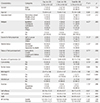Abstract
Purpose
The purpose of this study was to develop a self-management program applying Dongsasub training based on self-efficacy theory, and to verify the program effectiveness on self-esteem as well as self-efficacy, self-management behaviors, and blood pressure.
Methods
The study design was a non-equivalent, pre-post controlled quasi-experiment study. Thirty-eight patients aged 65 and older from a senior welfare center in Seoul participated in this study (20 patients in the experimental group and 18 patients in the control group). The self-management program applying Dongsasub training consisted of eight sessions. After development was complete the program was used with the experimental group. Outcome variables included self-efficacy, self-esteem, self-management behaviors measured by questionnaires, and blood pressure measured by electronic manometer.
Results
Self-efficacy (t=2.42, p =.021), self-esteem (t=2.57, p =.014) and self-management behaviors (t=2.21, p =.034) were significantly higher and systolic blood pressure (t=-2.14, p =.040) was significantly lower in the experimental group compared to the control group. However, diastolic blood pressure (t=-.85, p =.400) was not significantly different between the two groups.
Figures and Tables
References
1. Statistics Korea. 2012 annual report on the cause of death statistics [Internet]. Daejeon: Author;2013. cited 2014 December 20. Available from: http://kostat.go.kr/portal/korea/kor_nw/2/6/2/index.board?bmode=read&bSeq=&aSeq=308559&pageNo=1&rowNum=10&navCount=10&currPg=&sTarget=title&sTxt=.
2. Ministry of Health & Welfare. Korea Centers for Disease Control & Prevention. Korea health statistics 2012: Korea national health and nutrition examination survey (KNHANES V-3). Seoul: Ministry of Health & Welfare;2013.
3. James PA, Oparil S, Carter BL, Cushman WC, Dennison-Himmelfarb C, Handler J, et al. 2014 evidence-based guideline for the management of high blood pressure in adults: Report from the panel members appointed to the Eighth Joint National Committee (JNC 8). JAMA. 2014; 311(5):507–520. DOI: 10.1001/jama.2013.284427.
4. Min ES. The knowledge, health belief and compliance of hypertensive patients [master's thesis]. Daejeon: Eulji University;2011.
5. Bandura A. Self-efficacy: Toward a unifying theory of behavioral change. Psychol Rev. 1977; 84(2):191–215.
6. Park YI, Jun MH. The effect of a self-regulation program for hypertensives in rural areas. J Korean Acad Nurs. 2000; 30(5):1303–1317.
7. Wu MP, Wu SF, Wang TC, Kao MJ, Yang WL. Effectiveness of a community-based health promotion program targeting people with hypertension and high cholesterol. Nurs Health Sci. 2012; 14(2):173–181. DOI: 10.1111/j.1442-2018.2011.00675.x.
8. Lorig KR, Ritter P, Stewart AL, Sobel DS, Brown BW, Jr . , Bandura A, et al. Chronic disease self-management program: 2-year health status and health care utilization outcomes. Med Care. 2001; 39(11):1217–1223.
9. Marks R, Allegrante JP, Lorig K. A review and synthesis of research evidence for self-efficacy-enhancing interventions for reducing chronic disability: Implications for health education practice (part II). Health Promot Pract. 2005; 6(2):148–156. DOI: 10.1177/1524839904266792.
10. Yu SJ, Song MS, Lee YJ. The effects of self-efficacy promotion and education program on self-efficacy, self-care behavior, and blood pressure for elderly hypertensives. J Korean Acad Adult Nurs. 2001; 13(1):108–122.
11. Hermanns N, Kulzer B, Ehrmann D, Bergis-Jurgan N, Haak T. The effect of a diabetes education programme (PRIMAS) for people with type 1 diabetes: Results of a randomized trial. Diabetes Res Clin Pract. 2013; 102(3):149–157. DOI: 10.1016/j.diabres.2013.10.009.
12. Rivera-Hernandez M. Depression, self-esteem, diabetes care and self-care behaviors among middle-aged and older Mexicans. Diabetes Res Clin Pract. 2014; 105(1):70–78. DOI: 10.1016/j.diabres.2014.04.017.
13. Rosenberg M. Society and the adolescent self-image. Princeton, NJ: Princeton University Press;1965.
14. Backman K, Hentinen M. Factors associated with the self-care of home-dwelling elderly. Scand J Caring Sci. 2001; 15(3):195–202.
15. Boykin GL, Rice VJB. General self-reported health as it relates to self-esteem, situational self-efficacy and coping among soldiers. Proc Hum Fact Ergon Soc Annu Meet. 2013; 57(1):1551–1555. DOI: 10.1177/1541931213571345.
16. Oshita D, Hattori K, Iwakuma M. A Buddhist-based meditation practice for care and healing: An introduction and its application. Int J Nurs Pract. 2013; 19:Suppl 2. 15–23. DOI: 10.1111/ijn.12040.
17. van Son J, Nyklíčk I, Pop VJ, Pouwer F. Testing the effectiveness of a mindfulness-based intervention to reduce emotional distress in outpatients with diabetes (DiaMind): Design of a randomized controlled trial. BMC Public Health. 2011; 11:131.
18. Park SH. Dongsasub counseling. Seoul: Hakjisa Corp.;2007.
19. Chang HC. A study on self-esteem through dong-sa-sub, spiritual group counseling program [master's thesis]. Seoul: Yonsei University;2003.
20. Hwang JH, Cheon SM, Lee YS. The effects of dongsasub self discipline program on awareness of imaginations, interpersonal relations. Korean J Couns. 2009; 10(3):1327–1344.
21. Kahn RL, Goldfarb AI, Pollack M, Peck A. Brief objective measures for the determination of mental status in the aged. Am J Psychiatry. 1960; 117:326–328.
22. Park HA, Lee EO, Lim NY. Nursing, medical research statistical analysis. Paju: Soomoonsa;1998.
23. Park YI. An effect of the self-regulation program for hypertensives : Synthesis and testing of Orem and Bandura's theory [dissertation]. Seoul: Seoul National University;1994.
24. Lee YW. A study of the effect of an efficacy expectation promoting program on self-efficacy and self-care. J Korean Acad Adult Nurs. 1995; 7(2):212–227.
25. Jon BJ. Self-esteem: A test of its measurability. Yonsei Nonchong. 1974; 11(1):107–130.
26. The Korean Society of Hypertension. Hypertension management guidelines [Internet]. Seoul: Author;2013. cited 2014 December 20. Available from: http://www.koreanhypertension.org/pop/file/131107_01.pdf.
27. Park HS, Lee YM, Kang HJ, Choi YO, Bae ES. The effect of hypertension regulating education program on reduced blood pressure physiological parameters, self-care and self-efficacy. J Korean Gerontol Nurs. 2002; 4(1):38–48.
28. Fu D, Fu H, McGowan P, Shen YE, Zhu L, Yang H, et al. Implementation and quantitative evaluation of chronic disease self-management programme in Shanghai, China: Randomized controlled trial. Bull World Health Organ. 2003; 81(3):174–182.
29. Lee KJ, Kim SJ. The effects of percussion program on depression and self-esteem of the elderly living in residential care. J Korean Home Manage Assoc. 2011; 29(5):153–163.
30. Lee HS. The effects of mindfulness meditation on a schizophrenia patient' self-esteem and emotion. J Medit Based Psychol Couns. 2009; 4:146–188.




 PDF
PDF ePub
ePub Citation
Citation Print
Print





 XML Download
XML Download